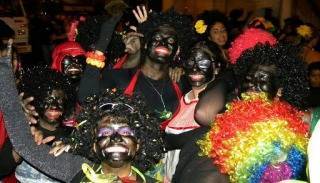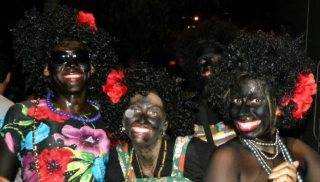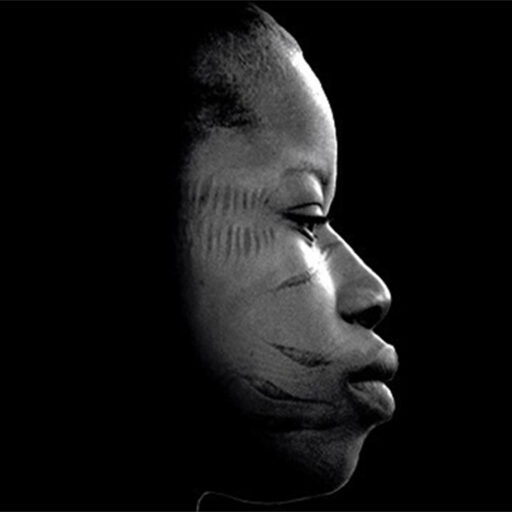Although the season of Carnaval has yet to start, when I came across these images, I was a little disturbed. I can’t say that I was shocked because the image of blackface seems to be a global thing nowadays. Even so, it still disgusts me when I see it.
So what’s the story here?
Every year for Carnaval in Brazil, Samba schools and blocos prepare to make their progressions for thousands of spectators. If you’ve ever seen videos of Brazilian Carnaval, particularly those from Rio de Janeiro, you know that the progressions and costumes can be quite elaborate. But, was’sup with the bloco composed of participants made up in blackface and the bright, red lipstick of the Spike Lee Bamboozled or Al Jolson variety? The bloco in the photos is known as the Bloco da Nega Maluca (Bloco of the Nega Maluca) and the group has been in existence for 34 years in the town of Angra dos Reis located in the state of Rio de Janeiro.

 In Portuguese, the Nega Maluca is a well-known stereotype of black women. Translated, the term literally means, “crazy black woman” or loud, quarelsome black woman. And as you can see from the photos, participants dress themselves in garish blackface makeup, bright red lipstick, completing the outfits with wild afro wigs, and padded, exaggerated breasts and booties. One of the origins of the Nega Maluca stereotype can be found in 1950 Carnaval song composed by Evaldo Ruy and Fernando Lobo. The story behind the song goes something like this. Ruy told his friend Lobo about a scene he witnessed in a bar. A guy is there playing pool with his friends when a black woman jumps in front of him with a child in her arms alleging that the child is his. The guy refuses to accept the child and repeatedly denies that the child is his.
In Portuguese, the Nega Maluca is a well-known stereotype of black women. Translated, the term literally means, “crazy black woman” or loud, quarelsome black woman. And as you can see from the photos, participants dress themselves in garish blackface makeup, bright red lipstick, completing the outfits with wild afro wigs, and padded, exaggerated breasts and booties. One of the origins of the Nega Maluca stereotype can be found in 1950 Carnaval song composed by Evaldo Ruy and Fernando Lobo. The story behind the song goes something like this. Ruy told his friend Lobo about a scene he witnessed in a bar. A guy is there playing pool with his friends when a black woman jumps in front of him with a child in her arms alleging that the child is his. The guy refuses to accept the child and repeatedly denies that the child is his.
Here are the lyrics:
“Nega Maluca” (Evaldo Ruy and Fernando Lobo)
Tava jogando sinuca (I was playing pool)
Uma nega maluca, Me apareceu (A crazy black woman appeared in front of me)
Vinha com um filho no colo (She had a child in her arms)
E dizia pro povo (And she said to the people)
Que o filho era meu, não senhor (That the child was mine, no sir)
Tome que o filho é seu, não senhor (Take him, the child is yours, no sir)
Pegue o que Deus lhe deu, não senhor (Get what God gave you, no sir)
What is perhaps most intriguing about the image of the Nega Maluca is the reaction to the character. In general, people have fun and are very jovial in the presence of the caricature with women, children and men all partaking in the imagery. Of course, the image provokes outrage in black American communities because of the racist, humiliating, dehumanizing depictions of black people. And in Brazil, I have stumbled across a few comments online that suggest that these images are not welcome.
 Nelson Olokofá Inocêncio, an assistant professor of the Institute of Arts at the University of Brasília, mentions the Nega Maluca character as an example of Brazil’s predjudicial culture that stigmatizes black people. Student/professor Leandro Dias of Salvador, Bahia, sees Nega Maluca as the epitome of the ridiculous representation of black people that standardizes and ojectifies the ethnicity. But as it is public pressure and outrage that usually leads to the discontinuation of offensive representations, apparently, blackface doesn’t particularly bother enough people that it should be discontinued in Brazil.
Nelson Olokofá Inocêncio, an assistant professor of the Institute of Arts at the University of Brasília, mentions the Nega Maluca character as an example of Brazil’s predjudicial culture that stigmatizes black people. Student/professor Leandro Dias of Salvador, Bahia, sees Nega Maluca as the epitome of the ridiculous representation of black people that standardizes and ojectifies the ethnicity. But as it is public pressure and outrage that usually leads to the discontinuation of offensive representations, apparently, blackface doesn’t particularly bother enough people that it should be discontinued in Brazil.
When I’ve posed the question of the use of blackface on Brazilian television to black Brazilians, I have yet to hear anyone who vehemently rejects the image. The use of blackface is still quite common on Brazilian television even today.
 Singer Seu Jorge (top left), actor Rodrigo Faro (bottom left) and Faro as Seu Jorge
Singer Seu Jorge (top left), actor Rodrigo Faro (bottom left) and Faro as Seu Jorge
I remember the first time I saw blackface on Brazilian television was in the year 2000 when a white television host donned blackface and a dreadlock wig to imitate the musical guests of the show, the sister act of Pepê and Neném. The Afro-Brazilian girl with whom I watched the program thought the image was funny. Me? Not so much.
 Singers Pepê and Neném
Singers Pepê and Neném
In retrospect, it is always necessary to consider the cultural history and background of any given society when coming to judgement about certain things and how people of that given society react to those things. With this in mind, I reached out to lawyer well-known lawyer, Humberto Adami Santos Junior of Rio de Janeiro. Humberto is on the front line of fighting racial discrimination in Brazilian society, was featured in a documentary about affirmative action, Brazil in Black and White and also was the lawyer that won a R$1.2 million settlement in a case against Sony Music for the racist content of a song, as reported here in early January. When I asked Humberto about these images, he responded:
“No tempo de Carnaval, tem sido tolerado essas e outras ‘brincadeiras’ (In Carnaval time, these ‘jokes’ and others have been tolerated).”
Be that as it may, I still don’t like it!
What do you think?
Feel free to leave a comment.
Source: Black Women of Brazil




